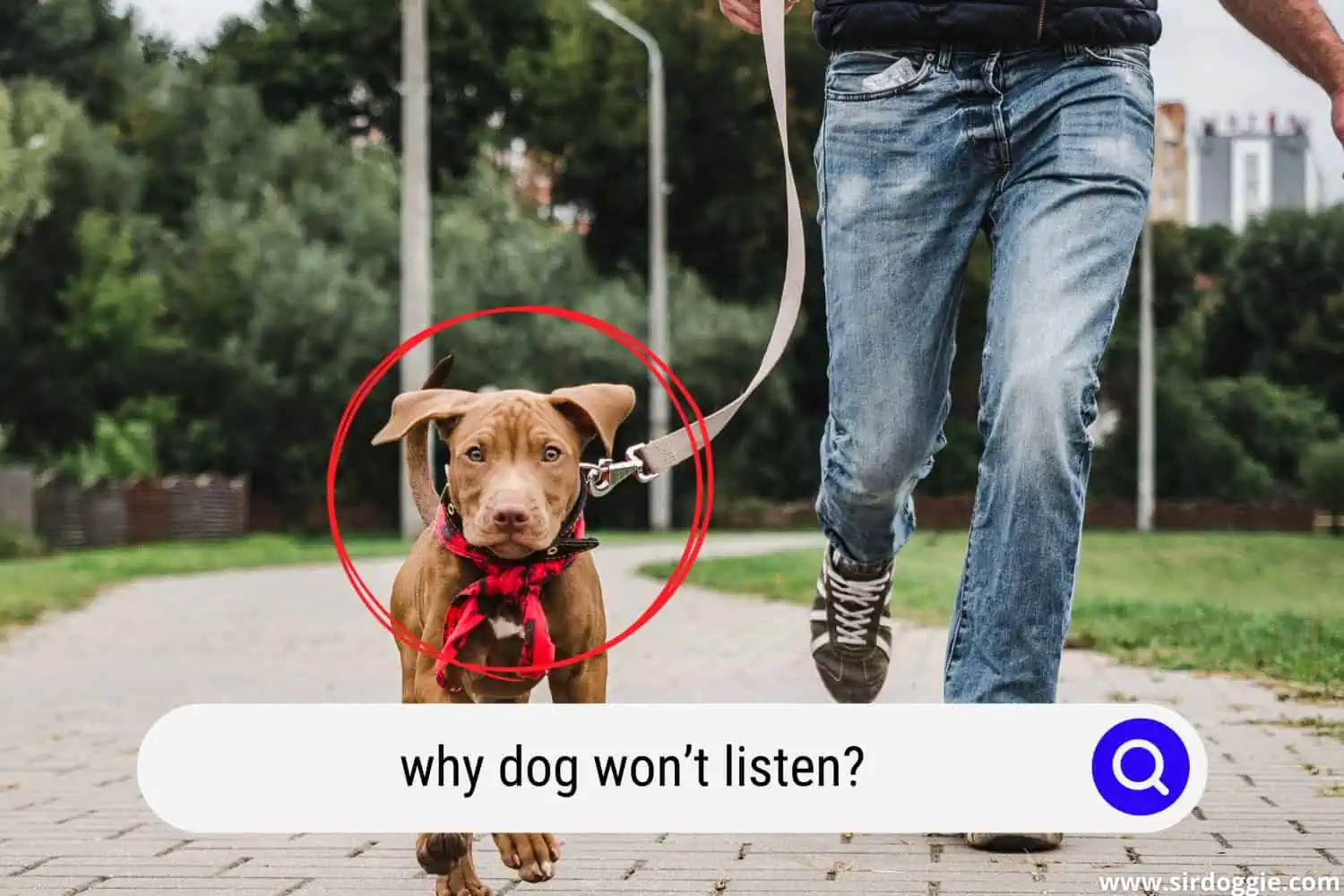10 Reasons Your Dog Won’t Listen (+7 Ways To Help)
Is your dog giving you deaf ears? Do you feel your dog is intentionally not listening to you?

Many people have a hard time keeping their dog’s attention. Many dog parents can’t figure out why their dog is not listening. In fact, one of the most common crises to solve as a dog parent is when your dog ignores you.
There are many reasons your dog ignores your commands. You can’t quickly label your dog as stubborn or begin shouting at it.
Related Reading: Why Your Dog Walks in Circles Around You
Here are 10 Reasons Why Your Dog Isn’t Listening to You
In this article, we are listing 10 reasons your dogs won’t listen to you and ignore your commands.
Let’s get started:
1. Your dog has a lot of energy
The biggest cause of misbehavior in dogs is when they have a lot of pent-up energy and their needs for exercise are not met.
Before attempting to teach anything to your dog, you may want to let them run around in the yard for a bit to take away some of their energy. The point is to get them to focus.
There are certain dog breeds that are classified as high-energy. These breeds will require an intensive exercise routine. They demonstrate their excess energy through unwanted behavior.
You need to channel that energy into outlets that fit your dog’s desire as well as your lifestyle. Exercise is the best answer and ultimate solution to problems with high-energy dogs.
Pet Parent Tip: Always talk to your dog care provider about your dog’s needs and energy. This will help you to give the right amount of exercise, activity, and supervision that your dog needs.
2. Your dog is bored
Dogs that suffer from boredom won’t listen to their owners. When their natural instinct is denied, they become frustrated and stop listening to you.
Signs of boredom will be different for every dog. These signs include
- Tearing up furniture
- Excessive and constant barking or whining
- Stealing food
- Pawing, jumping up, or extra licking to gain your attention
- Trying to escape
- Sleeping all the time
You certainly don’t have to entertain your dog all day long. Invest some time to keep your dog’s boredom at bay. Also, you need to add some mentally stimulating activities to keep them engaged.
3. Your dog is distracted
Dogs learn better with fewer distractions around. Many dogs listen reasonably in quiet environments but some struggle with distractions.
When the dogs are overwhelmed by the environment, they simply stop listening to you. Asking your dog to listen to you in a quiet room, with no distractions, is different from asking your dog to follow you at the dog park.
4. You are no longer the leader of the pack
If you want your dog to listen to you, you need to reassert yourself as the pack leader. If your dog doesn’t respect you, training it to listen to you can be an uphill battle.
This is what you should do:
- You must teach your dog that you are the leader of the pack.
- You need to teach your dog some obedience commands.
- You must teach your dog that you make the decisions
- You must teach your dog that you have the best of everything
- You must teach your dog that you decide when to play with him
- You must demonstrate to your dog that it is the lowest member of the “pack.”
5. You are offering a low rate of reinforcement
The rate of reinforcement is actually the number of rewards per amount of time. You can make your dog listen to you by offering it a high rate of reinforcement.
Some dogs can be given kibble, fruits, vegetables, bland biscuits, or stale biscuits as motivators. They can act as good motivators for hungry dogs. However, these treats take much too long to chew.
Try to choose dog treats that are small, soft, easily broken apart, and easily consumed. Your dog should quickly eat its treat and look to you for more. Try different treats and find out which ones work best.
If your dog is not motivated by food, you can try some other motivators. These include:
- Motivate your dog with praises or happy talk
- Motivate your dog with dog toys
- Motivate your dog with a game of fetch
- Motivate your dog with playtime with doggy pals
6. You might be teaching too many new things at once
Try not to introduce too many things at once. Your dog is likely going to forget if it has not mastered a skill and you’re moving on to the next thing.
Your dog needs time to practice what it has learned. Otherwise, your furry pal won’t be able to listen to you. Teaching new behaviors to a dog should be a process of evolution, not revolution.
7. Your dog needs more training
If your dog isn’t listening, it’s not because your furry pal is being difficult or stubborn. Maybe it just doesn’t get your command. You need to train them to do the right thing.
You cannot expect your dog to listen to you if it has not been trained and reinforced to do so. Most of us do teach basic obedience to our dogs but we do not reinforce them.
Instead of making your dog forget what it has learned, keep your dog’s established behaviors sharp. You can reinforce them regularly, by working them randomly and regularly, several times each day.

8. Your dog’s emotions are getting in the way
Dogs have unique personalities and they experience many feelings and emotions. These feelings encourage them to behave in certain ways.
Remember that the dog will carry its emotional state throughout the way it behaves. A dog who is anxious may not listen to you or act in a destructive manner. If your dog suddenly stops listening to a normal cue, it may be upset by something in the environment or by you.
9. Your dog is fearful
For some dogs, the outdoors overloads their senses. Dogs who are fearful are usually unable to focus. They will even turn their nose up at their favorite treats.
Some dogs are so fearful that they can’t even leave their front doorstep. This happens to dogs who were not properly socialized during the critical socialization period.
10. Your timing is off
If your dog doesn’t listen to you, timing may be an issue. Dogs are truly creatures of the moment. Timing helps dogs to understand what they are being rewarded or punished for.
The consequences of a dog’s behavior determine how much of that behavior we’ll see in the future. You have about 2 to 3 seconds after their behavior before the meaning is lost.
The behavior that is rewarded timely gets repeated. If rewards and good things tend to follow a behavior, a dog will do more of it. If there are no immediate responses from you, your dog will do less of it. To communicate effectively with your dog, you must learn to give an immediate response.
Your feedback must always be about what your dog is doing right now. If you want to make sense to your dog, you must respond to your dog’s behavior timely.
Remember that punishment is not the answer. It will only make your dog less likely to listen to you next time. The reason for the dog not listening to your needs to be addressed.
How to get your dog to listen to you?
When your dog won’t listen to you, it can be both frustrating and dangerous. You obviously want your dog to listen to you, but there are too many different factors to consider.
You have to deal with the underlying issue before you can get your dog to really listen to you.
Here are some measures that you can take to get your dog to listen to you:
1. Remove excess energy
If your dog’s listening seems on and off, consider that your dog may sometimes have too much energy to listen to you. Try tiring your dog out before giving it commands. This might help in making your dog more responsive.
Exercising your dog should not be a burden for you or your dog. Dogs need regular exercise to release their pent-up energy otherwise they may develop behavior issues.
Here are some things you can do together to release your dog’s excess energy and calm down an energetic dog in safe ways:
- Going for long walks
- Trying running and jogging
- Playing tug of war
- Fetch games
- Swimming
- Frisbee toss
- Agility exercise
Physical and mental stimulation through exercise and training will help channel your dog’s energy in a constructive way.
Every dog is different so the energy levels and exercise requirements can vary from dog to dog. Remember to practice the first exercise, then discipline, and then love.
Pet Parent Tip: If you don’t have much time to provide physical stimulation to your dog, consider a dog walker. He will come to your location and take your pet out for a walk. This way your furry friend will receive both physical and mental stimulation.
2. Be patient
Different dogs learn at different paces. You need to show some patience. Some dogs are highly intelligent and can master the cues or commands in just a few days. Others might take a couple of weeks or months.
Training and behavioral modification of your dog take time and effort. With patience, the end result will be worth it.
3. Be consistent
You need to be consistently firm and patient with your dog. There is no value in moving too fast. This will only result in frustration and destructive behavior. Take your time, lower your expectations, and allow your furry pal to move at its own pace.
Try to be consistent with your training method. Use a consistent set of cues or commands for your dog in the training sessions. Your dog may be confused when you use different cues and commands.
Sit down as a family and discuss the rules, boundaries, and limitations you want to set for your dog. All family members should enforce the same rules. If your dog is receiving different messages about its behavior, it won’t understand which behavior is desirable.
4. Teach your dog in a less distracting environment
A distraction is anything that decreases your dog’s ability to understand a cue or a command. For some dogs, even a walk in the neighborhood is too overstimulating to start with.
Start by training your dog in the backyard as it is a familiar place for your dog. A backyard is also much less distracting than going out in the neighborhood.
Your dog will be able to focus properly and learn the cues you are teaching her in an outdoor environment without overwhelming her with too much, too quickly.
Once your dog has mastered focus in this environment, you can try other places. Take your dog in the front yard or driveway, and later to dog parks.
5. Master your energy
You need to create a strong bond and a balanced relationship with your doggie.
Dogs are pack animals who listen to their pack leaders. You can only be that alpha leader if you are displaying calm-assertive energy.
Knowing your pack takes time, show some patience and acceptance. If you’re uncertain as you give a command, your dog will tune you out.
Remember, dogs don’t always crave a delicious treat. They need their owner to become their stable pack leader. Try to demonstrate love in a way your dog understands.
6. Notice your dog’s emotional state
Just like us, a dog’s body language often represents their emotions.
When your dog becomes happy, angry, afraid, or anxious, its body language changes. Usually, your dog’s emotional state is responding to one or more triggers in the environment.
A dog owner knows his dog more than anyone else. The more time you spend with your furry friend, the better you will be at reading your dog, and the stronger the mutual relationship will be.
7. Seek professional help
If all else fails, seek help from a professional dog trainer or professional dog behaviorist. You can take your dog to a training class or hire a professional trainer for one-on-one training.
If you continue to have problems, consider hiring a professional dog behaviorist to help. As mentioned above, one of our favorite professional online dog training courses is Brandon McMillan’s MasterClass.

Final Thoughts
Does your dog ever not listen to you? Do you know about some ways of getting its attention that always works?
All dogs are different and they respond to training and commands in different ways. Keep in mind that there could be a medical problem preventing your dog from listening to you.
Always check to be sure whether or not this is the case.

Family Dog Expert Author
Hi there! I’m Stuart, a devoted dog lover and family dog expert with over a decade of experience working with our furry companions. My passion for dogs drives me to share my knowledge and expertise, helping families build strong, loving bonds with their four-legged friends. When I’m not writing for SirDoggie, you’ll find me hiking, playing with my beautiful dog, or studying music.